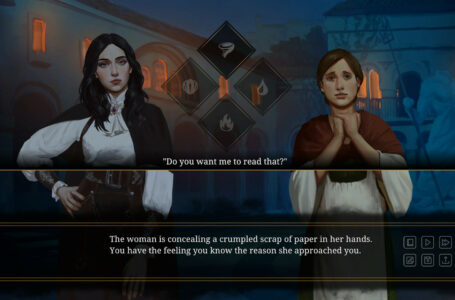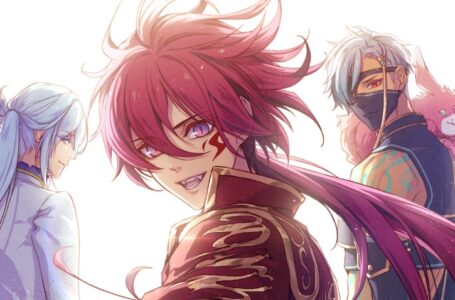Exploring Club Suicide’s common route and Eba’s story
After introducing the heavy subject of Club Suicide last week, it’s already time to dive into what we can currently experience of this intriguing “anti-otome” game as an English-only player. Remember, you can buy the game on DLsite to play it for yourself, and be sure to check out and bookmark KabedonUdon’s post on Reddit about the English partial patch release.
Do not read any further nor play Club Suicide if you cannot stomach delicate subject matters such as depression, suicide and death. Please consider your mental health first and foremost!
Please remember that minor spoilers will be mentioned.
The common route
Club Suicide’s common route only lasts ten minutes or so. It sets up the mental state of main character Ringo Shindou (whose name can be changed). We learn that she is a shy and meek 16 year old girl who is contemplating suicide due to feelings of insignificance. One day, she clocks a notice on her school’s bulletin board about the titular Club Suicide, a club meeting at the end of the day to prepare its members for their own suicides as well as providing a group effort of support and guidance over the course of the seven days prior to their graduation.
Her curiosity gets the better of her once she goes past the same board again before school ends, only to see the note gone — we can safely presume a teacher was doing their job and took it down. But that only increases Ringo’s intrigue about the situation, as she finds herself heading for the room described in the note, much to her own surprise. There she meets the game’s five main boys as soon as she enters.
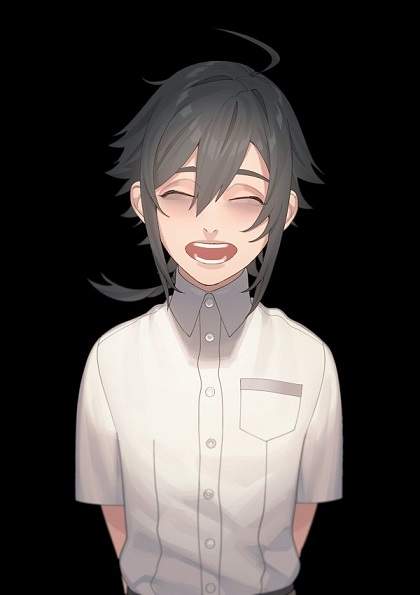
Eba Zaizen is the first to make an impression. He’s the youngest of the cast at age 15, and is just as antisocial and awkward as Ringo herself. He stutters all over the place and apologises for it as soon as they meet.
Meiyou Mabuchi is next to appear, and is the polar opposite, coming across as a confident and clear-speaking 16 year old with an aura of leadership, and the sense that he is a calm and collected individual.
Then there’s 17 year old Shiki Kururugi, a jock with a surprisingly light-hearted, humorous and friendly personality; a complete contrast to the imposing, tall and hostile 16 year old with quite the troubling attitude and short temper.
Out of all of them, 17 year old Usui Masaya comes across as the most unassuming and normal, being understandably quiet yet level-headed with measured responses to the other guys.
The writing is stupendously done right from the outset, with many clever and intriguing uses of poetic and symbolic language throughout, and a solid translation to English. It’s especially notable for the emphasis placed on Ringo’s feelings and the sense of a central conflict from the start all the way to a route’s end.
Ringo has something of a mental block about anything regarding her environment until she sees the note that sparks her curiosity, and her fascination with the male students opens her eyes to experiences that, in turn, help her learn to appreciate her own position in the world.
But while Ringo does end up changing for the better — so long as you’re on the road to the good endings, that is — the focus is never shifted away from the main point of the experience, which is to understand and guide the boys.
Each boy has their own reasons for wanting to die, and they each have goals that they want to achieve before they commit suicide in a week’s time. Eba has no hope for the future, but wants to give back to his parents. Masaya explains his desire to die as the fact that he was “unable to be a hero”, and seems to have no attachment to the world. Meiyou believes his death will make those close to him happier, but is scared of dying. Shiki is simply tired of existing, but wants to experience a romantic relationship before the end of his life. And finally, Mitsuki doesn’t want to grow older, but also needs to satisfy his desire for revenge before committing suicide.
By choosing a route to tackle, Ringo takes an interest in that particular character after her first encounter with the guys, and the story then covers a seven-day span prior to the group’s graduation ceremony. At this point, the rest of the group will then independently commit suicide. It’s at this point you will notice how supporting one of the guys in particular will inevitably mean the rest of them will almost certainly die.
It’s a troubling and disturbing fact to notice and contemplate, but the experience forces us to focus and hone in on each character one at a time, and discover what each of them have to teach us via their own morals, growth and mentality. Their individual stories are what we have to take away from the experience here, and as the game always puts it, we’re here only once. Our actions and words matter, especially when we can’t take them back. What’s done will be done, and so with that, let’s finally get into discussing the first route.
Thoughts on Eba’s route: a cinnamon roll who deserves happiness
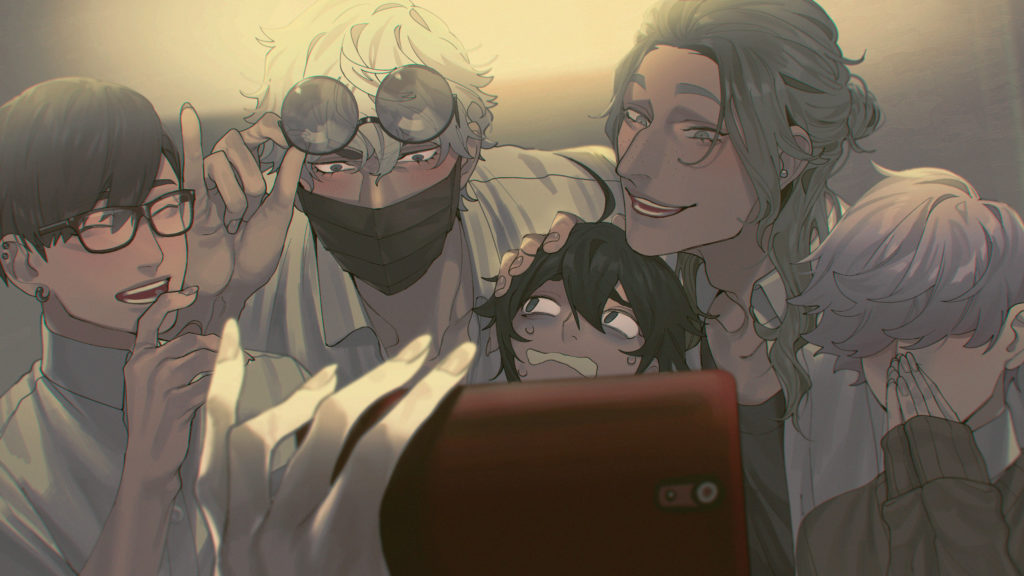
Eagle-eyed players will notes that Club Suicide’s opening subtly suggests a key item that is particularly relevant to each character. In Eba’s case, it’s a mobile phone, leading us to ponder how technology and Internet culture might affect Eba. You’ll want to analyse each and every bit of dialogue to understand Eba; the game is subtle enough that you really need to see every ending, including the “worst” ones, to truly get a picture of who Eba is.
This isn’t to say that Club Suicide shies away from more obvious visual cues. Eba’s casual clothing that he wears outside school, for example, features a plain T-shirt with an image of a low battery, symbolising his sense of exhaustion with life itself.
But before we get into unravelling all those layers, let’s cover the important stuff. Togai Sakato voices Eba and does an excellent job portraying his social awkwardness through his speech. We hear endearing excitement through an increase in pitch and more confident delivery when he’s discussing something his character is passionate about. His emotional delivery really packs a punch — and don’t even get me started on when he cries, which never fails to elicit a strong emotional reaction out of me, no matter how often I re-run those scenes!
Eba and Ringo might initially appear to share many similarities in temperament. They’re both otaku, stunted by their shy and antisocial personalities (I feel attacked – Ed.), are physically weak due to their hermit lifestyles, and they cannot see meaning in their own lives. But they have some key differences, too.
Eba has a loving and supportive family; both his parents live with him under the same roof, and they shower him with everything he needs. It’s a contrast with what we are led to believe is a less than ideal home setting for Ringo — we don’t see this explored directly in either the common route or Eba’s route, but it is hinted at in one of Eba’s bad endings.
Eba also has impressive talents, particularly in the creative fields. He’s a great artist, and an even greater crafter.
A multifaceted, realistic and human character
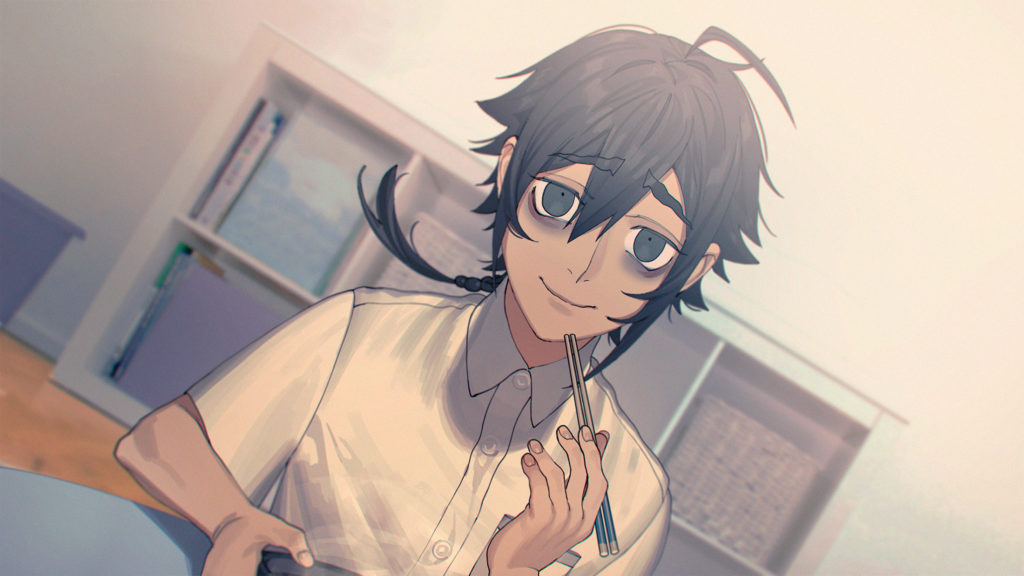
Therein lies the basis of Ringo’s initial interest in Eba: the question of why he would want to commit suicide when he has people around him that care about him. The game slowly unveils the many layers of Eba’s character to get to his reasoning behind this by shifting away from Ringo’s perspective at the beginning of days 3 to 5 in the narrative. These days provide us with a brief monologue from Eba’s perspective; they gradually increase in length and substance, revealing his internal thoughts and confirming his motives and doubts.
It’s a structure I can assume will be prevalent across all its routes, and unsurprisingly these parts pack the most nuanced segments of the game’s script. Not everything will necessarily be clear immediately, as Eba is an extremely well-written and complex character. If you truly want to understand him, it’s worth doing another full re-run of his route to select every possible dialogue option, since each one offers new pieces to his story and tidbits of further characterisation.
It gives the game an exceptionally thorough feel, and that’s because many of the choices in the game don’t outright lead to bad endings; they simply allow you to see alternative scenes and outcomes to situations. Would you rather see Eba’s toy-making skills or his paintings? Do you want to find out more about who he is as a person right now, or more about his origins and background?
Each seemingly inconsequential selection provides us the opportunity to see many different parts of Eba’s multifaceted character. The game is all about understanding these characters, after all, and this approach makes experiencing re-runs of the story desirable and emotionally investing.
A main character who subtly develops
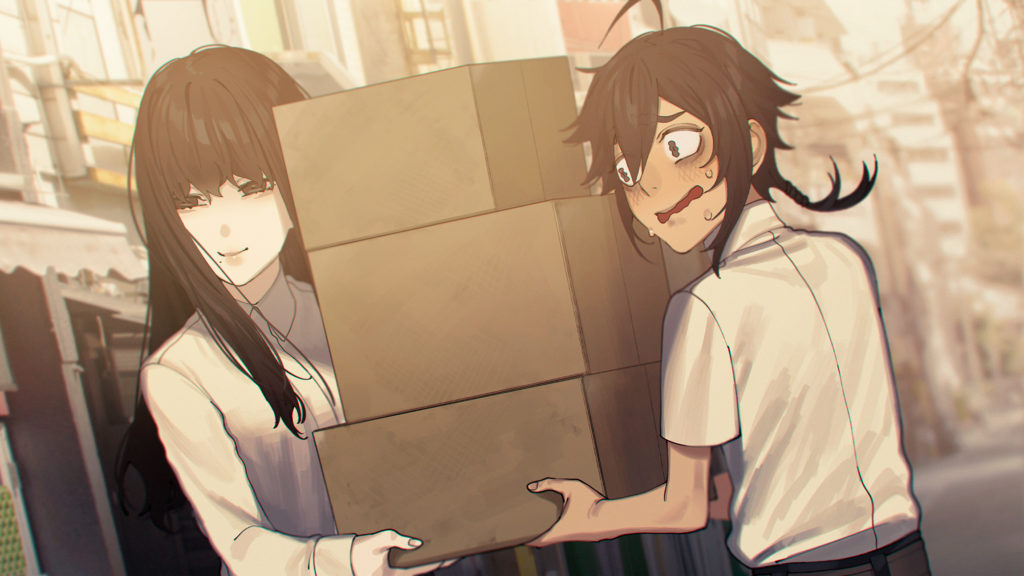
Ringo undergoes plenty of meaningful development, and learns to challenge her own prejudices and assumptions, particularly those about Eba’s loving and supportive family. She opens her eyes to how others can feel insignificant for reasons other than their environmental factors. It’s an issue of real-world relevance; anyone can feel suicidal, no matter who they are, how they come across or the way in which they conduct themselves.
On top of that, her curiosity turns into a desire to see Eba value himself. She begins to understand him, on a much deeper level than simply acknowledging their surface similarities — he becomes human, to both Ringo and the player. In the good ending, Ringo learns to respect him and comes a long way in standing up for her own morals. She learns the particular importance of positively reacting and responding to someone important to you who is suffering and in need of affirmation.
Eba’s relationship with Ringo is absolutely of love, but much like the rest of the game a certain amount is left up to interpretation. I found that their relationship came across like that of siblings, with both of them drawing strength from familial bonds and family units. The game never explicitly states it, mind, nor does it have to; the focus is on how meaningful the bond is, not its definition.
They make each other experience the things that ground them in their own lives, with Ringo feeling and expressing intense emotions from simply seeing him happy, and her encouragement and endorsement of all his efforts making him finally realise his worth.
The contemporary world is hell for young people
Considering Club Suicide is centred on the idea of death, Eba repeatedly avoids naming it as such; instead, he refers to it as a desire to “disappear”. He believes he is nothing, and therefore he should be nothing. I suspect each of the guys in the case will have their own distinct view on this core theme; it’s a key way in which they can express their complexity and individuality.
Eba’s concerns are understandable and legitimate. We can easily sympathise with him, relate to him, and most importantly, feel an overwhelming desire to see him overcome his demons. On that note, it seems surprisingly hard to unlock his bad endings, which adds even more characterisation to him; it makes us question his perception of death and disappearance.
They may be harrowing to experience, but they are important narrative components when it comes to accepting Eba’s entire character and arc — which is the entire point of the game as a whole. Ultimately, Eba’s character is about the dismissing of one’s own talents and worthiness in a world where everyone and anyone can be a star if given enough attention, praise and chances.
Eba also has an inner saboteur; he hates himself, believing himself to be a failure. His extremely critical and flawed view of himself in this way is hauntingly human, and all too familiar in our world. It’s easy for people to feel unworthy when seemingly average or unremarkable people are able to make a name and audience for themselves, while others who are just as talented or even more so go unrecognised.
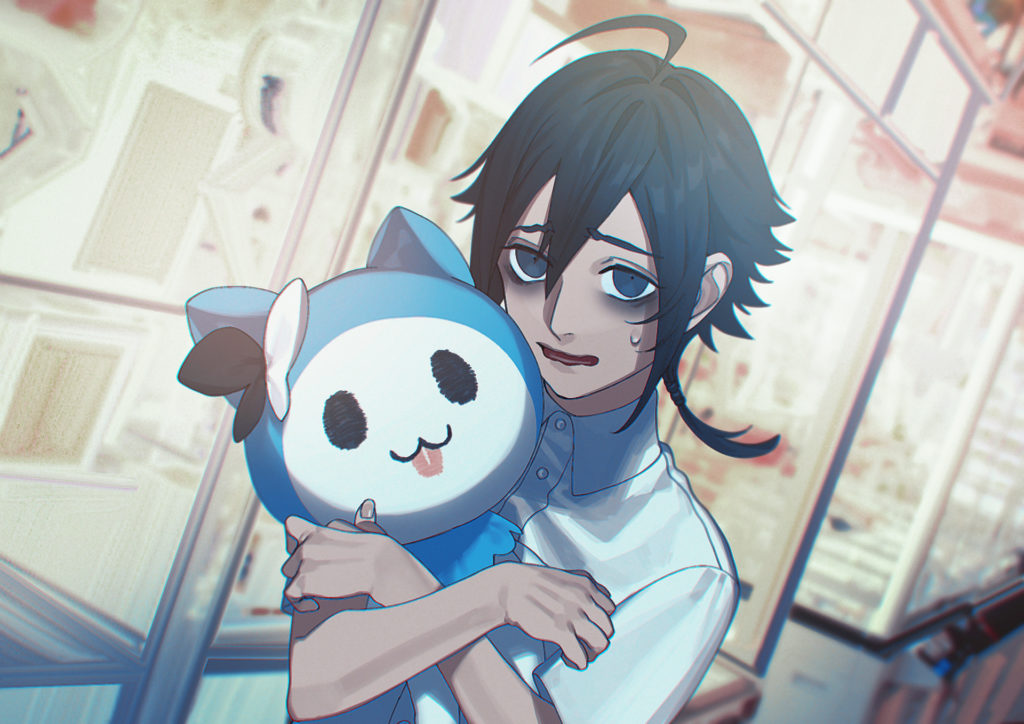
Existing is meaningful
Ultimately, the takeaway of Eba’s route is that the experience of living is in itself meaningful. Each and every moment can be grand or insignificant; every action, event and word can be special to someone. The connections we create, make and keep for life, or the little things we do for others as gifts or favours — all of them are meaningful.
Eba’s journey is one of self-love, and his character teaches the audience that simply doing our best with as small or as large of a supportive circle as you want or can attain is more than enough. He is enough, and we are enough.
I’m thankful that Eba’s route is the first I experienced, and that I reached its good ending without using a walkthrough. I feel like I managed to make a good enough impact on his life — though I feel I’m unable to say the same for the next character I’m exploring, Mabuchi, which I’m working through with the assistance of the Kira Does Otome blog. He’s much more difficult to understand, with even more symbolic and poetic language being used in his route; hopefully I haven’t let him down, but I guess we’ll soon find out!
In the meantime, I can confidently say that Club Suicide is proving to be a must-play in the visual novel medium. It’s been an experience I continue to think long and hard about long after I step away from the screen, and I doubt that will change any time soon.
Join The Discussion
Rice Digital Discord
Rice Digital Twitter
Rice Digital Facebook
Or write us a letter for the Rice Digital Friday Letters Page by clicking here!
Disclosure: Some links in this article may be affiliate links, which means we may earn a small commission if you make a purchase after clicking on them. This is at no additional cost to you and helps support Rice Digital!
- Sigh of the Abyss: Shadow Bonds – Prologue Review - October 7, 2023
- Is She The Wolf? is wickedly addicting TV - October 6, 2023
- The steady consumption of Slow Damage - October 5, 2023






